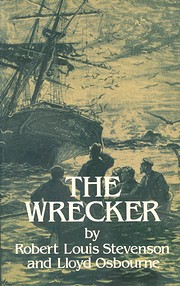

Fai clic su di un'immagine per andare a Google Ricerca Libri.
|
Sto caricando le informazioni... Il saccheggiatore di relitti (1892)di Robert Louis Stevenson, Lloyd Osbourne
 Sto caricando le informazioni...
Iscriviti per consentire a LibraryThing di scoprire se ti piacerà questo libro. Attualmente non vi sono conversazioni su questo libro.  Il faut un peu d'attention pour entrer dans la matière de ce Stevenson mais le lecteur n'y sera pas déçu. A condition toutefois de ne pas y voir un de ces benêts romans d'aventure qui jonchent les rayonnages où tout est bien qui finit bien dans le meilleur des mondes possibles. Stevenson, ce n'est pas cela et on a tort de le cantonner à la littérature d'aventure parce qu'il a commis "l'île au trésor". Avec Stevenson, les personnages sont fuyants, retords, plein de retournements (Long John Silver était comme cela). Les faces sombres des personnages éclairent douloureusement les histoires que l'auteur nous raconte. Et dans ce "trafiquant", il n'y a pour lumière crue que l'arnaque, la combine, les petits recoins sordides des hommes, les gagne-petits, les écornifleurs et les assassins en puissance. Tout cela sous le beau soleil du Pacifique et de la Californie. Si Borges et Conrad admiraient Stevenson, c'est parce que ses décors sont ceux de l'aventure humaine. Les personnages ont une épaisseur peu commune, y compris dans la vacuité. Ce roman est jonché de forts en gueule et de trognes de caractère. Débuté comme un roman à portée quasi économique dans l'aventure capitalistique du Nouveau Monde, le livre enchaîne des actions à tiroir qui désorientent le lecteur et qui le laisse témoin d'un sordide fait divers sous couvert d'un mystère à résoudre. Il y a des passages hallucinants dans ce livre, dont celles se déroulant sur le Flying Scudd. Le lecteur quitte l'histoire avec l'impression d'un échec complet, à l'opposé de l'avenir triomphant que lui promettait "L'île au trésor". C'est tragique, c'est sombre, c'est Stevenson. The Wrecker is different from other Robert Louis Stevenson books I've read. For one thing, he wrote the novel with his stepson, Lloyd Osborne. Also, Stevenson and Osborne seemed to be experimenting with form: We had long been at once attracted and repelled by that very modern form of the police novel or mystery story, which consists in beginning your yarn anywhere but at the beginning, and finishing it anywhere but at the end; attracted by its peculiar interest when done, and the peculiar difficulties that attend its execution; repelled by that appearance of insincerity and shallowness of tone, which seems its inevitable drawback. For the mind of the reader, always bent to pick up clews, receives no impression of reality or life, rather of an airless, elaborate mechanism; and the book remains enthralling, but insignificant, like a game of chess, not a work of human art... After we had invented at some expense of time this method of approaching and fortifying our police novel, it occurred to us it had been invented previously by someone else, and was in fact—however painfully different the results may seem—the method of Charles Dickens in his later work. At the time Stevenson and Osborne wrote the novel, the mystery genre was still in its early days. In many ways, the novel is more like the sensation novels of the Victorian era than 20th century (or later) mysteries. Of course, it also has a strong element of adventure typical of Stevenson's better-known works. While the premise is interesting, the structure isn't entirely successful. The setting shifts between Scotland, Paris, San Francisco, Midway Islands, and Australia. The mystery isn't introduced until about halfway through the book. The suspense builds once the wreck of the Flying Scud enters the story. Why is the wreck so valuable? What secrets does it hold? Why does its captain behave so strangely? The first-person narrator, Loudon Dodd, is perceptive enough to question many of the circumstances, but not perceptive enough to piece together an explanation without a revelation from another character. I wouldn't have discovered this book had I not been looking for something with a Midway Islands setting. It was a mildly entertaining read, and I learned a little about some unfamiliar occupations and parts of the world. Since I downloaded it free on the Internet, it didn't cost me anything but time. Taiohae, archipel des Marquises. Le jeune Loudon Dodd, en dépit d une famille bourgeoise lui rêvant une carrière de boursicoteur, s émancipe finalement et découvre les avantages du métier d armateur. Appelé par Jim Pinkerton dans le grand port de San Francisco puis initié à des affaires pour le moins hasardeuses, le jeune aventurier s approprie, pour la revendre, la cargaison d un navire échoué aux abords d une île. L équipage, hagard, lui apprend alors qu au lieu d inoffensifs sacs de riz, c est bel et bien de l opium en quantité astronomique que transportait le bateau... nessuna recensione | aggiungi una recensione
È contenuto in
Fiction.
Mystery.
Humor (Fiction.)
HTML: This sprawling nautical adventure tale from Robert Louis Stevenson adds a dash of humor and mystery to the formula that the author perfected in classic yarns like Kidnapped and Treasure Island. Co-written with Lloyd Osbourne, Stevenson's stepson, this novel is a must-read for fans of the action-adventure genre. .Non sono state trovate descrizioni di biblioteche |
Discussioni correntiNessunoCopertine popolari
 Google Books — Sto caricando le informazioni... Google Books — Sto caricando le informazioni...GeneriSistema Decimale Melvil (DDC)823.8Literature English & Old English literatures English fiction Victorian period 1837-1900Classificazione LCVotoMedia: (3.54) (3.54)
Sei tu?Diventa un autore di LibraryThing. |
||||||||||||||||||||||||||||||||||||||||||||||||||||||||||||||||||||||||||||||||||||||||||||||||||||||||||||||||||||||||||